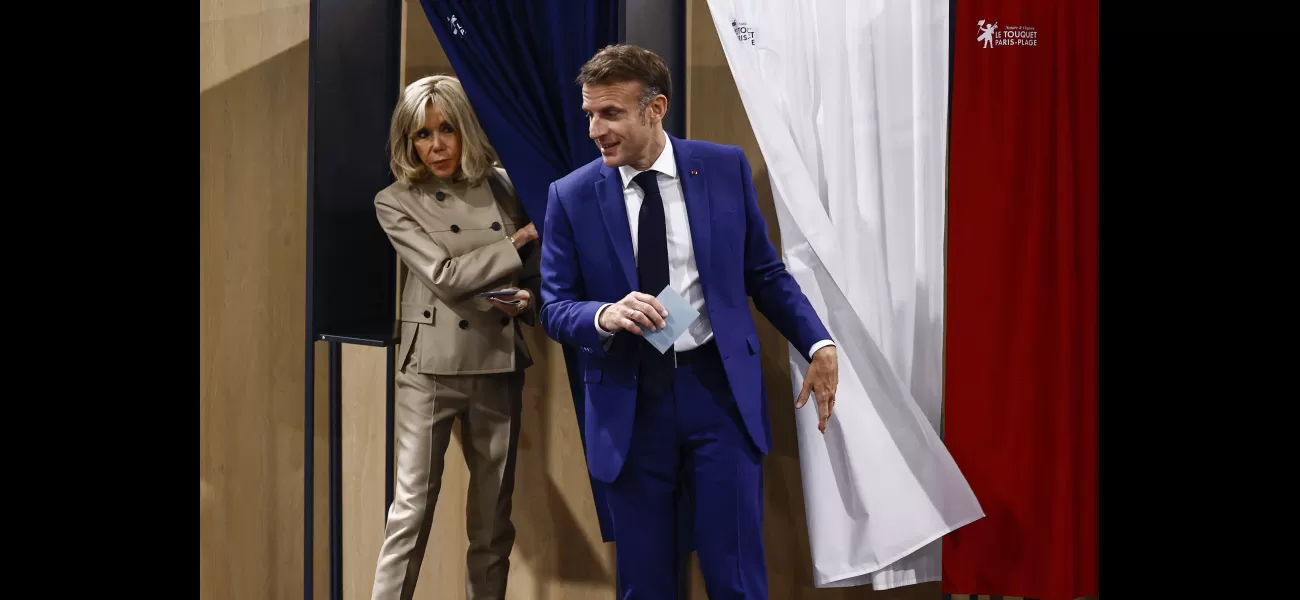Extreme right grows in France as the globe monitors crucial election.
The National Rally's initial electoral success fell short of securing a clear victory.
June 30th 2024.

France's recent legislative elections have caused quite a stir, with the far-right National Rally making significant strides in the first-round vote. This outcome, while not decisive, has dealt a major blow to centrist President Emmanuel Macron.
Early projections by French polling agencies show that Macron's decision to call for a second round of voting has not yielded the desired results. In fact, these projections indicate that his centrist party may finish a distant third in the first-round ballot. This puts them behind both Marine Le Pen's National Rally and a new left-wing coalition, which joined forces to prevent the far-right party, with its historical ties to anti-Semitism, from forming the first far-right government in France since World War II.
With a week of intense campaigning still to come before the final round of voting next Sunday, the ultimate outcome of the election remains uncertain. Macron has called on voters to unite against the far-right in the second round.
Meanwhile, Le Pen, addressing a jubilant crowd waving French tricolor flags, has urged her supporters and those who did not back her party in the first round to push them over the line and give them a commanding legislative majority. In this scenario, her 28-year-old protege Jordan Bardella would become prime minister, forcing Macron into a power-sharing arrangement known as "cohabitation."
However, the National Rally is not yet in the clear. While early projections give them around one-third of the national vote, it is still unclear how this surge will translate into actual seats in the second round. Some projections show that they could potentially secure a clear majority in the 577-seat National Assembly, which could have significant implications for the country's financial markets, its relationship with Ukraine, and its global military presence.
On the other hand, the far-right could also fall short in the final round, as projections show that no single party is likely to secure a clear majority. This is due to the two-round voting system and the possibility of parties forming alliances or pulling out of certain constituencies between rounds. Official results for the first round are expected later this morning.
Many French voters are frustrated with issues such as inflation and economic concerns, as well as Macron's leadership, which is often seen as arrogant and out-of-touch with their lives. The National Rally has tapped into this discontent, particularly through online platforms like TikTok.
Issues such as immigration and the rising cost of living were on the minds of voters in Paris, as the country becomes increasingly divided between the far-right and far-left blocs, with a weakened and unpopular president in the center. The campaign has also been marred by a rise in hate speech.
Cynthia Justine, a 44-year-old voter, expressed her frustration with the current state of affairs, saying that people are angry and feel that they have lost a lot in recent years. She also emphasized the importance of voting, especially for women who have not always had the right to do so, and for Black women like herself, for whom there is a lot at stake.
Macron called for these early elections after his party suffered a defeat in the European Parliament election in June, losing to the National Rally, which has historic ties to racism and anti-Semitism and is hostile towards France's Muslim community. It also has connections to Russia.
This move was a bold gamble on Macron's part, as he hoped that French voters, who were complacent in the European election, would be motivated to turn out for moderate parties in the national elections to keep the far-right at bay.
Philippe Lempereur, a 64-year-old voter, expressed his fatigue with politicians from the left, right, and center, and their inability to work together on important issues like providing shelter and food for people. He said that people often vote for the "least worst option," and he prefers to vote rather than do nothing.
Bardella, who has no experience in government, has stated that if elected, he would use his powers as prime minister to prevent Macron from continuing to supply long-range weapons to Ukraine for its ongoing conflict with Russia. The National Rally has also questioned the right to citizenship for those born in France and wants to limit the rights of French citizens with dual nationality. This has been met with criticism, as it goes against human rights and poses a threat to France's democratic values.
The promises of huge public spending by both the National Rally and the left-wing coalition have caused concern among financial markets and raised questions about France's already heavy debt, which has been criticized by EU watchdogs.
In the French Pacific territory of New Caledonia, polls closed earlier due to a curfew that authorities extended until July 8. This was in response to a surge of violence last month, which resulted from the government's attempts to amend the French Constitution and change voting lists, causing fear among the Indigenous Kanaks that they would be further marginalized. They have long sought independence from France.
Voters in other overseas territories and those voting in offices set up by French embassies and consular posts across the Americas cast their ballots on Saturday.
In conclusion, France's legislative elections have brought to light many issues and concerns, with the far-right gaining significant support and the country becoming increasingly divided. The outcome of the second round of voting remains uncertain, but one thing is clear: the French people are passionate about their right to vote and are determined to make their voices heard.
Early projections by French polling agencies show that Macron's decision to call for a second round of voting has not yielded the desired results. In fact, these projections indicate that his centrist party may finish a distant third in the first-round ballot. This puts them behind both Marine Le Pen's National Rally and a new left-wing coalition, which joined forces to prevent the far-right party, with its historical ties to anti-Semitism, from forming the first far-right government in France since World War II.
With a week of intense campaigning still to come before the final round of voting next Sunday, the ultimate outcome of the election remains uncertain. Macron has called on voters to unite against the far-right in the second round.
Meanwhile, Le Pen, addressing a jubilant crowd waving French tricolor flags, has urged her supporters and those who did not back her party in the first round to push them over the line and give them a commanding legislative majority. In this scenario, her 28-year-old protege Jordan Bardella would become prime minister, forcing Macron into a power-sharing arrangement known as "cohabitation."
However, the National Rally is not yet in the clear. While early projections give them around one-third of the national vote, it is still unclear how this surge will translate into actual seats in the second round. Some projections show that they could potentially secure a clear majority in the 577-seat National Assembly, which could have significant implications for the country's financial markets, its relationship with Ukraine, and its global military presence.
On the other hand, the far-right could also fall short in the final round, as projections show that no single party is likely to secure a clear majority. This is due to the two-round voting system and the possibility of parties forming alliances or pulling out of certain constituencies between rounds. Official results for the first round are expected later this morning.
Many French voters are frustrated with issues such as inflation and economic concerns, as well as Macron's leadership, which is often seen as arrogant and out-of-touch with their lives. The National Rally has tapped into this discontent, particularly through online platforms like TikTok.
Issues such as immigration and the rising cost of living were on the minds of voters in Paris, as the country becomes increasingly divided between the far-right and far-left blocs, with a weakened and unpopular president in the center. The campaign has also been marred by a rise in hate speech.
Cynthia Justine, a 44-year-old voter, expressed her frustration with the current state of affairs, saying that people are angry and feel that they have lost a lot in recent years. She also emphasized the importance of voting, especially for women who have not always had the right to do so, and for Black women like herself, for whom there is a lot at stake.
Macron called for these early elections after his party suffered a defeat in the European Parliament election in June, losing to the National Rally, which has historic ties to racism and anti-Semitism and is hostile towards France's Muslim community. It also has connections to Russia.
This move was a bold gamble on Macron's part, as he hoped that French voters, who were complacent in the European election, would be motivated to turn out for moderate parties in the national elections to keep the far-right at bay.
Philippe Lempereur, a 64-year-old voter, expressed his fatigue with politicians from the left, right, and center, and their inability to work together on important issues like providing shelter and food for people. He said that people often vote for the "least worst option," and he prefers to vote rather than do nothing.
Bardella, who has no experience in government, has stated that if elected, he would use his powers as prime minister to prevent Macron from continuing to supply long-range weapons to Ukraine for its ongoing conflict with Russia. The National Rally has also questioned the right to citizenship for those born in France and wants to limit the rights of French citizens with dual nationality. This has been met with criticism, as it goes against human rights and poses a threat to France's democratic values.
The promises of huge public spending by both the National Rally and the left-wing coalition have caused concern among financial markets and raised questions about France's already heavy debt, which has been criticized by EU watchdogs.
In the French Pacific territory of New Caledonia, polls closed earlier due to a curfew that authorities extended until July 8. This was in response to a surge of violence last month, which resulted from the government's attempts to amend the French Constitution and change voting lists, causing fear among the Indigenous Kanaks that they would be further marginalized. They have long sought independence from France.
Voters in other overseas territories and those voting in offices set up by French embassies and consular posts across the Americas cast their ballots on Saturday.
In conclusion, France's legislative elections have brought to light many issues and concerns, with the far-right gaining significant support and the country becoming increasingly divided. The outcome of the second round of voting remains uncertain, but one thing is clear: the French people are passionate about their right to vote and are determined to make their voices heard.
[This article has been trending online recently and has been generated with AI. Your feed is customized.]
[Generative AI is experimental.]
0
0
Submit Comment





